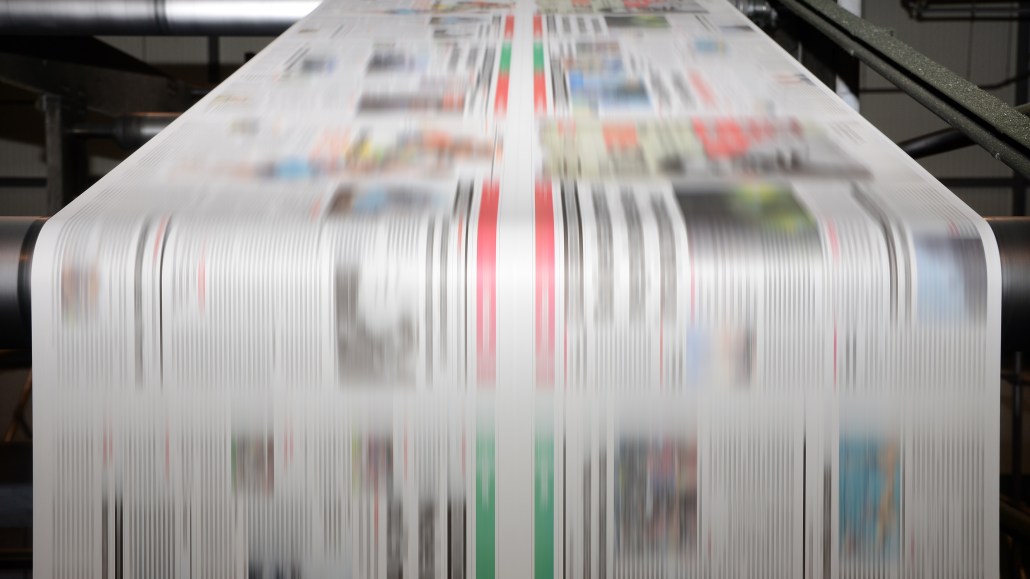Last chance to save on Digiday Publishing Summit passes is February 9

LinkedIn is often the forgotten giant of the platforms world. With more than 57 million unique visitors in the U.S. in February 2014 and a healthy business, it is now ramping up its efforts to attract marketers to embrace “always-on” publishing there.
The business network hopes to encourage companies to create their own “brand journalism” initiatives — and then pay LinkedIn to promote and target their stories. The goal is to induce more companies to build brand publishing experiences that will live on and off LinkedIn, according to executives involved in the program.
“[LinkedIn] obviously wants to push this extremely hard since it’s having a lot of success from their influencer program,” said Sebastian Jespersen, CEO of digital agency Vertic, told Digiday. “Now they want to give the same opportunity to brands.”
Jespersen pointed to AARP’s Life Reimagined for Work website and corresponding LinkedIn group as an example of how brands should publish on their own and extend that experience into LinkedIn.
The moves are something of a mirror to what Facebook’s done with brands. It first encouraged brands to publish on its platform, then it rolled out a series of “certified” developers to help the brands, and it capped that with an ad program to distribute brand messages.
“[LinkedIn] has always seen that content is creating more engagement than anything else. The issue for the brands is that they don’t have the infrastructure to create this content,” Jespersen said.
Vertic was one of the five certified LinkedIn developers invited to a LinkedIn-hosted event in preparation for the push. Other developer partners in attendance included Brainsonic, BrandNetworks, Friend2Friend and ThisMoment. LinkedIn declined to comment on the initiative.
“When you and I started using Linkedin, it was a place to post our resumes and get a job,” he said. “It’s now more about people trying to consume content from their industry and make industry connections.”
That content, of course, needs to come from somewhere. Toward that end, LinkedIn is adding traditional publishers to its network of preferred content providers.
The Atlantic, Bloomberg, CBSi (the network’s digital arm) and IDG, owner of publishing titles GamePro and Macworld, were among the attendees at LinkedIn’s inaugural partner summit held earlier this month, according to a list of attendees provided to Digiday. All of them, however, declined to comment for this story.
In partnering with high-profile publishers, LinkedIn will likely be looking to expand the content brokerage program it started earlier this year. In that instance, tech company Emerson paid LinkedIn to promote an Atlantic story on the professional network and target it at professional women. LinkedIn users who clicked on the promoted post — “Sponsored Update” in LinkedIn parlance — were directed to TheAtlantic.com for a story surrounded by Emerson ads. The Atlantic was paid in traffic — and thus incremental ad revenue — generated by that promotion.
The third prong to LinkedIn’s strategy is developing a similar relationship with content-marketing shops to write stories on behalf of brands — and subsequently distribute them via LinkedIn, according Elisa Cool, director of sales at Contently. The content marketing teams involved include Atlantic Media Strategies (The Atlantic’s digital marketing division), Contently, Freshwire, Newscred, Percolate, Rallyverse and Vaynermedia, Cool added. LinkedIn is not the publishing destination for these stories, just the distribution mechanism, she said.
That approach to editorial content has been lucrative for Facebook and Twitter. But as with those platforms, the publishers involved are all a strategy or algorithm tweak away from seeing their traffic-referral driver vanish.
Image via Shutterstock
More in Media

Brands invest in creators for reach as celebs fill the Big Game spots
The Super Bowl is no longer just about day-of posts or prime-time commercials, but the expanding creator ecosystem surrounding it.

WTF is the IAB’s AI Accountability for Publishers Act (and what happens next)?
The IAB introduced a draft bill to make AI companies pay for scraping publishers’ content. Here’s how it’ll differ from copyright law, and what comes next.

Media Briefing: A solid Q4 gives publishers breathing room as they build revenue beyond search
Q4 gave publishers a win — but as ad dollars return, AI-driven discovery shifts mean growth in 2026 will hinge on relevance, not reach.





